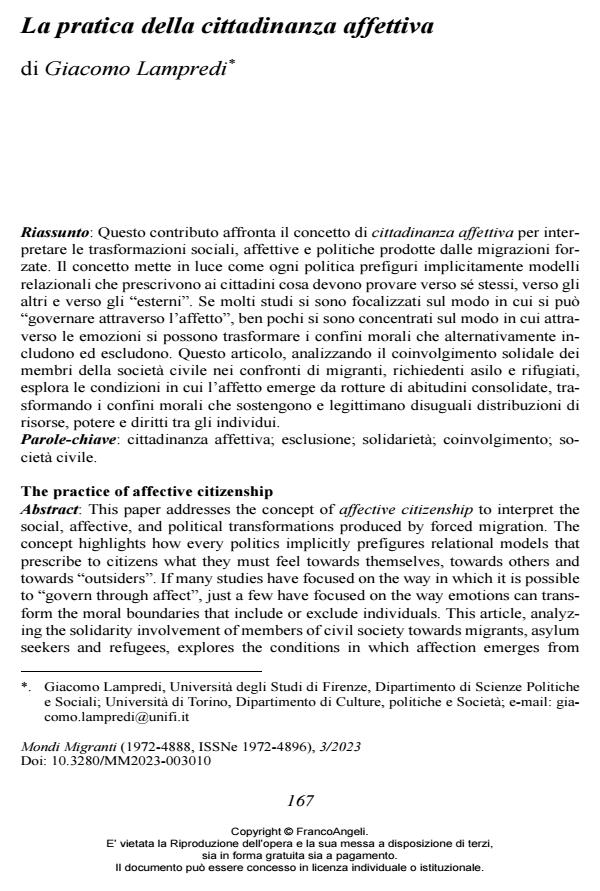La pratica della cittadinanza affettiva
Titolo Rivista MONDI MIGRANTI
Autori/Curatori Giacomo Lampredi
Anno di pubblicazione 2023 Fascicolo 2023/3
Lingua Italiano Numero pagine 19 P. 167-185 Dimensione file 206 KB
DOI 10.3280/MM2023-003010
Il DOI è il codice a barre della proprietà intellettuale: per saperne di più
clicca qui
Qui sotto puoi vedere in anteprima la prima pagina di questo articolo.
Se questo articolo ti interessa, lo puoi acquistare (e scaricare in formato pdf) seguendo le facili indicazioni per acquistare il download credit. Acquista Download Credits per scaricare questo Articolo in formato PDF

FrancoAngeli è membro della Publishers International Linking Association, Inc (PILA), associazione indipendente e non profit per facilitare (attraverso i servizi tecnologici implementati da CrossRef.org) l’accesso degli studiosi ai contenuti digitali nelle pubblicazioni professionali e scientifiche.
Questo contributo affronta il concetto di cittadinanza affettiva per interpretare le trasformazioni sociali, affettive e politiche prodotte dalle migrazioni forza-te. Il concetto mette in luce come ogni politica prefiguri implicitamente model-li relazionali che prescrivono ai cittadini cosa devono provare verso sé stessi, verso gli altri e verso gli “esterni”. Se molti studi si sono focalizzati sul modo in cui si può “governare attraverso l’affetto”, ben pochi si sono concentrati sul modo in cui attraverso le emozioni si possono trasformare i confini morali che alternativamente includono ed escludono. Questo articolo, analizzando il coinvolgimento solidale dei membri della società civile nei confronti di mi-granti, richiedenti asilo e rifugiati, esplora le condizioni in cui l’affetto emerge da rotture di abitudini consolidate, trasformando i confini morali che sosten-gono e legittimano disuguali distribuzioni di risorse, potere e diritti tra gli in-dividui.
Parole chiave:cittadinanza affettiva; esclusione; solidarietà; coinvolgimento; società civile.
Giacomo Lampredi, La pratica della cittadinanza affettiva in "MONDI MIGRANTI" 3/2023, pp 167-185, DOI: 10.3280/MM2023-003010